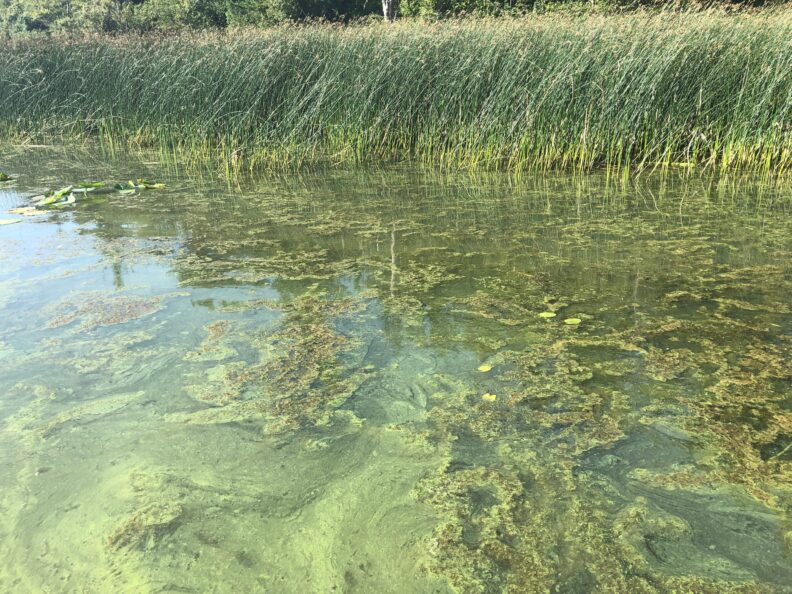
Living by a lake comes with buckets of fun AND a splash of responsibility. If you live by a lake, there are several things you can do (and avoid doing) to keep your lake clean, happy, and healthy for everyone. For more information about our Shore Stewards program, contact Don McMoran at dmcmoran@wsu.edu.
Algae blooms are the biggest threat to Skagit County Lakes. Algae blooms can…
- Be toxic to people and pets.
- Harm fish and wildlife.
- Lower property values.

Algae blooms happen when there are too many nutrients in the water, particularly phosphorus. Skagit soils already have high levels of phosphorus, but extra sources of nutrients can make algae blooms worse. These extra nutrients can come from…
- Fertilizer used in lawns and gardens.
- Pet waste.
- Septic systems.
You can help keep your lake clean in relatively simple ways. Some of these practices will even save you money!
Skip the fertilizer
When you fertilize your lawn, a lot of that fertilizer ends up flowing into the lake when it rains. That means more nutrients in the water, which means more algae in your lake. Here’s what you can do:
- Skip the fertilizer— Our soil sampling shows that Skagit soils already have adequate to high levels of the nutrients grass needs to grow, especially phosphorus
- Use lawn clippings to fertilize— Leaving lawn clippings on the lawn after you mow serves as FREE natural fertilizer as it breaks down!
- Test your soil before you fertilize— Getting a soil test can show you what nutrients your soil is missing and what it already has enough of.
- Use slow release, phosphorus-free fertilizer— If you must fertilize, slow-release fertilizers without phosphorus will be the least harmful to water quality.
Scoop the poop
Your pet’s poop is filled with nutrients, and some nasty bacteria, parasites, and pathogens might be tagging along, too. Rainwater picks up everything it touches – including the dog poop in your yard – and carries it to the lake. The nutrients fuel algae blooms. The bacteria, parasites, and pathogens can make people and pets who come in contact with the water sick.
Scoop the poop in a plastic bag and throw it away in the trash to help keep your lake clean and safe. Visit poopsmart.org to learn more!
Get a septic inspection
Just like dog poop in your yard, failing septic systems send extra nutrients and harmful bacteria into the lake. Failing systems can also be expensive to fix, especially when unmaintained.
Getting a septic inspection once every 1-3 years will help make sure that your septic system does not contaminate your lake. It will also help you stay on top of maintenance before you run into an expensive problem!
Lose the lawn
Rain gardens and yards full of native plants rather than grass can have many benefits. Native plants and rain gardens can…
- Filter water that runs to the lake.
- Reduce goose presence.
- Provide habitat for native animals and pollinators.
- Require less maintenance like watering and fertilizing than grass lawns.
Replacing your lawn, in full or in part, with native plants or a rain garden can help keep both your lake and your yard beautiful.
Other threats
Other threats to Skagit County lakes include invasive plants, invasive animals, erosion, and pollution. Here’s what you can do to protect your lake:
- Clean all gear when moving between water bodies, including your boots and boat. This can help prevent the spread of invasive species. Learn why and how to clean, drain, and dry your equipment here.
- Never dump aquarium contents (animals, plants, water, or substrate) into the lake.
- Check your car for leaks and get them fixed promptly. Learn how proper car care affects water quality here.
- Wash your car at a commercial car wash or on the lawn, not in your driveway.
- Keep garbage, including leftover bait and fishing gear, out of the lake.
- Avoid damaging or letting your pet damage native plants around the lake.
More resources
- Shore stewards website
- LakeWise
- Freshwater harmful algal blooms, King County
- Freshwater Algae Control Program, Department of Ecology WA
- Washington Noxious Weeds Control Board
- Natural Insecticides, Washington State University
